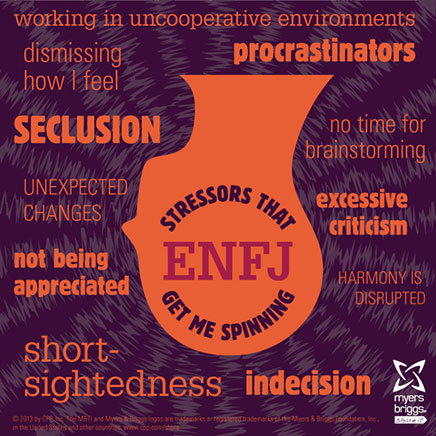INFJ – The Counselor
What stresses out an INFJ:
– Having to focus too much on sensory/concrete details
– An overload of sensory stimulation or noise
– Interruptions
– Distress within a close relationship
– Having their values violated
– Not enough alone time. Too much extraverting.
– Working with closed-minded people
– Lack of appreciation or understanding
– Unfamiliar environments with overwhelming amounts of details
– Having plans disrupted
– Not having a clear direction
– Lack of harmony
– Criticism and conflict
– Not being able to use their intuition or envision the future
– Having to focus too much on the present
When under stress, the INFJ feels fragmented or lost. They feel like they can’t be themselves, and feel an urge to act a part to “survive†or fit in. This disassociation can cause physical symptoms for the INFJ, like headaches, IBS, or nausea. The repressed feelings they’re holding onto can cause them to become immobilized. If they are under chronic extreme stress, they may fall into the grip of their inferior function, extraverted sensing. When this happens, they may engage in indulgent, self-destructive habits like binge-eating, cutting, over-exercising, alcoholism, or excessive pornography use. This often feels like an out-of-body experience to them. What they do provides no pleasure, but feels somewhat robotic and out of control. After this occurs, they dwell in self-hatred, falling even more into guilt over what they’ve done. They may become uncharacteristically angry and quick-tempered, unreasonable, and irrational. They may become obsessed with details in their outer world; obsessively cleaning or doing housework. They stumble over their words, and their intense feelings eventually lead them to a state of complete exhaustion.
How to help an INFJ experiencing stress:
– Give them space.
– Reduce sensory stimulation; music, interruptions, TV, etc,..
– Let them express their thoughts and feelings.
– Understand that they may be irrational. Don’t judge them.
– Don’t give advice. This will only stress them out further.
– Let them take a break from some of their responsibilities
– Encourage them to spend some time in nature, walking or reading a book.
– Take a walk with them if they want company.
– Encourage their less serious side, and let them relieve emotional tension by letting them cry through a sappy movie or novel of some sort.
– Be forgiving if they’ve been overly harsh or critical while under stress. Chances are, they will feel very guilty about it.
If I did, I'm sure it would affect me though.







